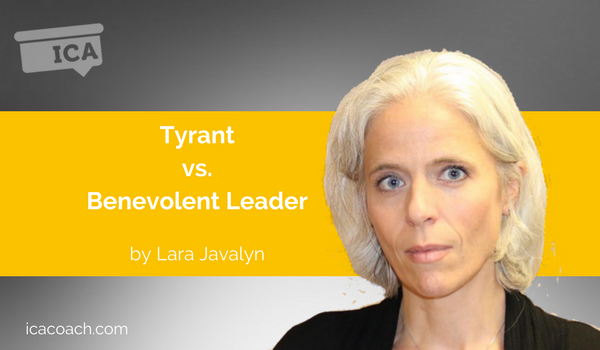
A Coaching Power Tool Created by Lara Javalyn
(Transformational Coach, CANADA)
Background
The daily decisions and many choices we face is an ongoing exercise in self leadership. Questions about what we will do can be based on past experience, new learnings, or taking advice. The actions we take is only a partial indication of their value and the ultimate outcome. Having awareness of how and why we take action is crucial in aligning to our goals and vision. This power tool challenges the notion that simply taking action is enough. Action must be paired with a holistic view of our lives, a tempered approach, aware of how it effects others, and a long-view of the desired outcome.
Who is the Tyrant?
We all have the need for some level of certainty, power and control in our lives. These needs are usually met naturally when we are taking care of ourselves physically and don’t have a high level of stress in our lives. When we are not meeting these basic needs, another part of us, the Tyrant, can arise to help address that gap. The Tyrant is focused on getting back a sense of control quickly. This impatience, along with a short-term view of our lives, can be effective as force and anger can scare others, and ourselves into submission. For example, when someone has gained 20 lbs and realizes that they have not been in control of their eating, often the first thought is to go on a crash diet. The Tyrant supports this solution as it seems the quickest way back to control and power over our physical body. The downside of this is of course sustainability and potentially counter-productive activities. As it is with a country that is led by a Tyrant, short-term gains can be destroyed quickly by the long-term costs of a narrow view and harsh methods.
Positive aspects of the Tyrant
Negative aspects of the Tyrant
Who is the Benevolent Leader?
The balancing aspect to the Tyrant is the Benevolent Leader. This aspect of ourselves has the long-view, is connected to our sense of life purpose, and has access to solutions for problems that are both healthy for ourselves and for those that are connected to us. An example of a person who lives mainly from his Benevolent Leader aspect is the Dalai Lama. He is a leader whose life purpose is connected to awakening the true potential in all beings. His goals of helping the Tibetan people be free, wherever they now live, is reflected in his decades-long service speaking and teaching on peace and compassion. His goal of freeing Tibet has not been realized, but his contributions and higher purpose is still being served and that is reflected through his everyday actions supporting his goals. One important aspect of living from the Benevolent Leader aspect is the need to regularly connect to our higher goals, qualities, and reasons why we do what we do. Practices of connection to higher purpose through prayer, devotions, and/or calling-over our biggest goals is essential to stay focused over the long-term.
Positive aspects of the Benevolent Leader
Negative aspects of the Benevolent Leader
Connection to ICF Coaching Competencies
The main focus of this Power Tool is on the Creating Awareness competency. With a sense of how the clients goals are connected to their life purpose there is a sense of fulfillment and excitement that can be generated that is sustainable over the long-term. There is a natural outplay of this awareness that is supported through focusing on the three other Facilitating and Learning Results competencies: Designing Actions, Planning and Goal Setting, and Managing Progress and Accountability.
Coaching applications for this Power Tool
This Power Tool challenges the coaching client to ask themselves not only what are their goals, but look at the healthiest ways to perform them with consideration for not just themselves and their health, but also how their actions affect others. The client may be thinking to make quick fixes and have small goals. Challenging the client to thinking in bigger terms, even beyond themselves and to the world, can help them shift their perspective and help them develop and sustain goals that have a greater positive impact on their lives.
Sample coaching questions:
- How will your friends and family benefit from you realizing this goal?
- How does this goal connect to your life purpose?
- If you don’t realize this goal, how will that affect your life and the lives of others around you?
- What are some ways that your actions to reach your goal will harm others or yourself?
- If what ways can this goal have the greatest positive impact on your life?
- What daily practices can you do to help you focus your energy on the best possible outcome?
- How will accomplishing your goals have a positive impact on the world?